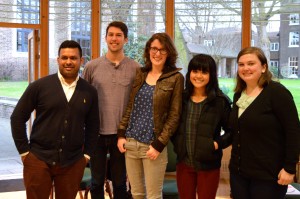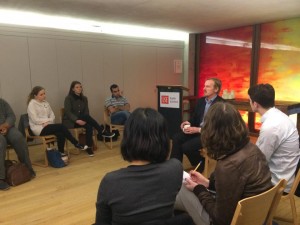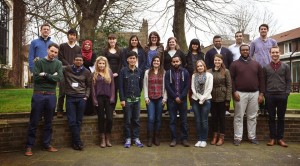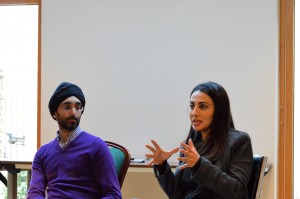
Greg Doolittle, MSC in International Development and Humanitarian Emergencies, and one of the first cohort of LSE Faith & Leadership, relates his experience of participating in the Faith Centre’s innovative extra-curricular certificate in religious literacy and effective leadership for the contemporary world.

The LSE Faith Centre undertook a pilot program this Lent Term, convening an extracurricular program in Faith & Leadership in which I participated. A group of around twenty students was selected to participate and that group met for eight weeks out of the term. Diverse even by the standards of the LSE, the group included postgrad and undergrad students from all major world religions with representatives from some of the smaller ones as well.

Although no preparatory readings were required and no exam was administered, we engaged in remarkably earnest discussions regularly into the late Monday evenings; the course became a highlight of my week.

Our sessions had a distinct character to them. For the first few minutes we met in a small subset that remained constant all throughout the course, with which we sat and with which we began the evening in reflection on the previous week’s speaker. My subset was made up of four individuals plus myself; none of us were coreligionists; two were male, three female; we were both undergrads and postgrads; three different nationalities were represented. This made for quite a diversity of perspective on any issue that came up, with some of us bringing lived experience to bear on a given issue, while others of us brought more learned knowledge, and still others of us brought only our curiosity. It was wonderful to watch each other increase our body of knowledge concerning religious issues as the program unfolded.

Through the lens of these discussion subsets we viewed some incredible guest lecturers of which I’ve chosen to highlight three. The speakers were an undeniable asset of the program, reason enough to merit my continued participation, and I learned a great deal even from the speakers I’ve left out of this writing. Rabbi Shoshana Boyd Gelfand led the group through a comprehensive review of the different periods of Jewish history and thought before explaining to the class that she herself was a Jewish atheist, rejecting the existence of G-D but identifying with the cultural and literary achievements of Judaism; this provoked the sort of discussion that lasts for weeks at a low boil, on how someone could be a Rabbi and a leader of the Jewish community and not believe in a higher power. Another compelling speaker was Simon Keyes, the former director of St Ethelburga’s Centre for Reconciliation and Peace, who came to discuss mediation as he had experienced it while working with IRA members and British army veterans to engage in peacebuilding dialogues; the procedures in place to get these former adversaries talking to one another in a constructive way was fascinating to me and the rest of us in the program, who had never really considered the practicalities of getting religiously-motivated adversaries to the discussion table. Perhaps the most compelling speaker in the series was Shaykh Abdal Hakim Murad formerly known as Timothy Winter, Dean of the Cambridge Muslim College and one of the most influential Sunni Muslims in the world. He spoke topically about radicalism within global Islam as one who has counselled against it from within, while also providing an authoritative primer on the basic constructs of the faith. The speakers were certainly the centrepiece of the program, and rightly so.
Another selling point of the program was its culminating retreat. All 20 of the participants were invited to a residential at The Royal Foundation of St. Katherine, a centre for religious conventions and gatherings in Limehouse.

Aside from staying in what amounted to a hotel and being fed home-cooked dinners and regularly served teas, the residential provided a space for us to hear from even more excellent speakers but, perhaps more importantly, to reflect on all that we’d learned over the course of the program. The speakers from the retreat that stuck with me the most were Michael Binyon, a Leader Writer for The Times, who spoke about how faith is approached in the media, and Stephen Timms, an MP and Labour Party Faith envoy who told of the time he was stabbed by a fanatic and what he learned from the experience. At the end of a reflective two days we were awarded our Faith & Leadership Certificates and we dispersed with greater religious literacy and, I think, with a few new friends as well.

Speaking only for myself, I found the Faith & Leadership program to be well worth my time. I learned a great deal about religion generally but what I found was far more useful was the exposure to religious practitioners who acted as primary source documents, cutting through media narratives and whatever preconceived notions I had about a religion, exposing me to how a faith’s practitioners thought and felt, straight from the source. It also enabled me to interact with a group of strong young professionals at LSE that I would probably not have been exposed to otherwise, who shared my curiosity about things religious. I would highly recommend the program; you could do far worse with your Monday evenings.


